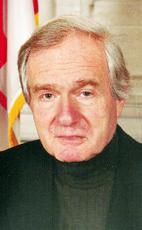Mr. Speaker, as you will probably know, Bosnia was a beautiful part of the world, rich with culture, endowed with natural resources, producer of excellent wines, abundant with historical sights, the meeting place of Christian and Muslim architecture where minarets and church towers punctuated the skyline of cities, towns and villages.
Today that Bosnia no longer exists. Its civilian population lives in terror, famine and mourning.
Today in this Chamber we have been asked by the government to think about Canada's role as a peacekeeper and in particular about Canada's role in Bosnia. Here are my thoughts on our role in Bosnia.
It seems to me that the Government of Canada should continue the role of our armed forces in Bosnia while continuing to press for a political solution in Geneva.
Why do I say that? I say it for a number of reasons. Canadian troops in Bosnia these days are providing humanitarian relief. They are offering the most civilized role any military force can provide. They are ensuring survival and life protection, quite in contrast with the conventional role played by the military throughout centuries.
The withdrawal of our Canadian troops from Bosnia would mean in essence abandoning the civilian population to its fate of starvation and possibly death. Our withdrawal would mean that other nations whose troops are part of the United Nations effort in the former Yugoslavia may follow our example if we were to withdraw. Women, children and the elderly would run the risk of being wiped out or becoming another wave of refugees seeking a homeland elsewhere. Withdrawal would mean creating a crisis in adjacent regions. International security could be put in serious danger in the Balkans.
From the relatively contained problem in Bosnia, the danger of spreading is high with very serious security implications and even the possibility of laying the foundations for another world
war conflict. The withdrawal would mean a victory for the bullies who are pursuing the policy of ethnic cleansing, an abhorrent, barbaric, repulsive, blood-chilling concept which the world community must continue to reject and deplore vigorously.
All Canadians abhor the notion of ethnic cleansing. We are strong believers in human rights. We promote human rights at home and abroad at every international forum. In Bosnia the human rights of people who have lived there for centuries have been trampled upon. The Government of Canada should not lead Canada into a retreat but rather continue to protect innocent people in Bosnia through the United Nations and with the help of like-minded nations also involved there.
These are the reasons why I would sincerely hope that the Government of Canada will continue maintaining its present role, the fine and unique role that our troops are performing these days in certain parts of Bosnia.
During this debate a number of arguments have been advanced in favour of withdrawal. I will mention a few but they are not very compelling. Some have said: "Oh well, this is a civil war. There is no reason for any of us to be there". This is an ethnic war. Bosnia as a state, as a cohesive society, hardly exists any more.
Then there are those who have said that the situation has reached a point where air attacks are the only answer. However, what happens after the air strike? What does the world community do after it has bombed? Has that been thought through as to the consequences of such a measure which basically would affect the civilian population? We are not talking here of large armies concentrated in visible and easily targeted points. We are talking about very interspersed forces that are very difficult to focus on and reach.
There are also those who have said that this is too large a financial burden. Well, can you imagine Canada saying to the world community, to France, the United Kingdom, the Scandinavians, the Netherlands and others, that we find this role too expensive for Canada, a nation with the reputation that we have of wealth, abundance and the capacity to be generously available to the world community? What a sham that would be.
There are those who have said that we should withdraw our troops from Croatia for six months. What would happen to the Bosnian population during those six months? Has that question been explored?
Then there are those who have said there is no peace to keep.
Evidently that is a point that one has to take into account because we are not at that point yet. Therefore the answer is true. There is no peace to keep at the present time, but there are tens of thousands of lives that can be saved. I rest my case on those considerations.

